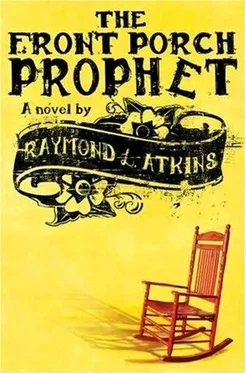“That heart attack should have killed him,” Doc Miller told A.J. when they met in the emergency room in Chattanooga, the location of the nearest hospital of consequence. He seemed shaken. “His heart stopped on the way here in the ambulance. All you could hear was that long, steady tone coming from the monitor. Before I could do anything, and believe me, I was moving fast, his own fist slammed into his chest, and he yelled No! I’ll be damned if his heart didn’t start beating again.” Doc shook his head. “I’ve been a doctor for fifty years, and I’ve seen a lot in my time. But I’ve never seen anything like that.”
“Nobody tells John Robert what to do,” was A.J.’s reply as he watched his father through the glass of the ICU. “Not even God.”
John Robert’s recovery was slow, and he almost died again during the bypass surgery that followed his attack. It was the surgeon’s skill rather than his own stubbornness that saved him that time, although to hear John Robert tell it, the man had nearly done him in. This trace of acrimony was due to a talk the doctor had with John Robert that was not altogether to the elder Longstreet’s liking. During the conversation, the physician extracted a promise from John Robert that the Pall Mall he was currently smoking would be his last. This was no small demand to make upon a man who had thoroughly enjoyed the two packs a day he had smoked for the last half century. The doctor explained that anything less than full compliance would be fatal. John Robert eyed him coolly for a moment. Then he stubbed out the item in question in a handy potted plant and quit on the spot.
Having survived two brushes with death and the loss of his favorite and perhaps only vice, John Robert should have been out of the forest. But he had one last blow to sustain. Upon his release with a clean bill of health, he and A.J. sat down on a cold winter afternoon and tallied the medical bills that had been piling up in the knife drawer for two months during John Robert’s convalescence. Life is cheap in many instances, but in John Robert’s case the price of continued existence was in excess of one hundred thousand dollars, not small change except to those who spend the public monies.
A.J. called Charnell Jackson to seek financial advice. Charnell was the only lawyer in Sequoyah and one of John Robert’s oldest friends. They had been boys together, and John Robert hadn’t held it against Charnell when he had chosen to read the law. Charnell looked over the debts and viewed the available assets. Then he advised John Robert to file for bankruptcy. John Robert’s reaction was negative, as if he had been advised to kick a good dog.
“I’m not broke,” he said. “I have a little money in the bank, and I own the farm outright.”
“The point is not what you have, John,” was Charnell’s patient reply. “The point is what you get to keep.”
“The point is, I owe the money. They did their part, and now I have to do mine.” He was quiet for a moment before rendering his decision. “Charnell, see if you can find a buyer for the farm. It ought to more than cover what I owe. Fix it so I can keep title to the cemetery plot and always have use of the road up to it. I’ll need to tend to Rose and Mama.” He looked at A.J. “I’m sorry about your inheritance.”
“I already have a house, John Robert, and I can’t farm for shit.” He smiled at his father, trying to make him feel better. “You’re doing me a favor.”
“When the farm sells, I’d like to come stay with you and Maggie. At least for a while.” A.J. was surprised John Robert had even brought it up; he and Maggie had been trying to talk him into moving in with them since Granmama had passed away.
Thus it came to pass that John Robert retired from farm life. The day after the farm sold, he arrived at the Folly with a truckload of belongings and was quickly incorporated into the household. A.J and Maggie had the impression John Robert was simply coming to live with them, but the elder Longstreet had more than mere occupancy in mind. The house was spotless before the first week was over, and three square meals per day began to grace the table. Maggie and. A.J. protested that he needed to relax and enjoy his golden years, but John Robert paid scant heed. Jobs that A.J. had been putting off were completed. John Robert washed windows, waxed floors, painted cabinets, mowed the yard, and did the shopping. He even dispatched the venerable repository known as the sewing barrel, into which many a torn item had been placed and forgotten.
“If I had known this,” Maggie observed one Saturday, “I’d have peeled you off years ago and married John Robert.”
“If I had known this,” came A.J.’s reply, “I would have burned the farm and given you away at the wedding.” He paused. “But I still make better lumber than he does.”
“Of course you do,” she replied, patting his leg absently as she turned the page of the book she was reading.
But all of that was long ago and far away, and A.J. was thinking of none of it as he prepared to depart for work to meet the new owners. He told John Robert to brief Maggie on what was up when she arrived, gave J.J. a kiss, and headed out into the wild, bad world, which was licking its chops as it awaited his arrival.
As was his custom, A.J. was working up to an agitated state, although his calm exterior gave no hint. He did not like uncertainty or change. He was a pessimist by nature, so by the time he drove into the sawmill parking lot, he had succeeded in losing all objectivity concerning the upcoming meeting. As he left the truck, he considered taking the Slugger with him in case he encountered a snake or two at the meeting. But he rejected the notion in favor of going for that good first impression.
A.J. had an itchy spot between his shoulder blades when he entered the conference room. He noticed the rest of the staff members were already there, looking nervous. John McCord was sitting in the front of the room with three somber men wearing nice suits. John wore blue jeans, as did the remainder of the attendees. The most solemn of the three newcomers looked pointedly at his watch as A.J. sat down. He was on time, but arriving fashionably early had apparently become a new company standard during the last couple of hours, and no one had informed him.
He had a bad feeling about the man with the watch. He leaned over and whispered to Ellis Simpson, his counterpart over at the planer mill. “I bet you five he’s wearing red suspenders to match that tie.”
“Shut up, A.J.,” Ellis hissed back. “This shit is serious.” Ellis had the habit of squinting one eye when he spoke, like Popeye. He was a good supervisor, and he, his nine children, and his wife, Raynell, all liked to eat three times a day.
“Boys,” John McCord began, “I have sold the sawmill, and I am retiring. The man to my left is Mr. Ralph Hunter. He is vice president in charge of lumber operations for Alabama Southern. You now work at that corporation’s fifteenth sawmill. They also own four plywood factories, a particleboard mill, two paper mills, and three chip mills. They are the big dogs. I believe Mr. Hunter has a few words to say.”
As John McCord sat down, his gaze met A.J.’s, and in that instant, A.J. knew. John looked old, and he looked tired, but more than that, he looked guilty. McCord averted his eyes quickly, but the truth had been revealed. A.J. realized with certainty his saw-milling days were drawing to a close. He grasped that a long career with Alabama Southern was not ahead. What he did not yet know was how he felt about that.
Ralph Hunter removed his jacket before addressing the troops. His red suspenders gleamed, and the way A.J. saw it, Ellis Simpson now owed him five dollars, although collection might prove difficult.
Читать дальше












